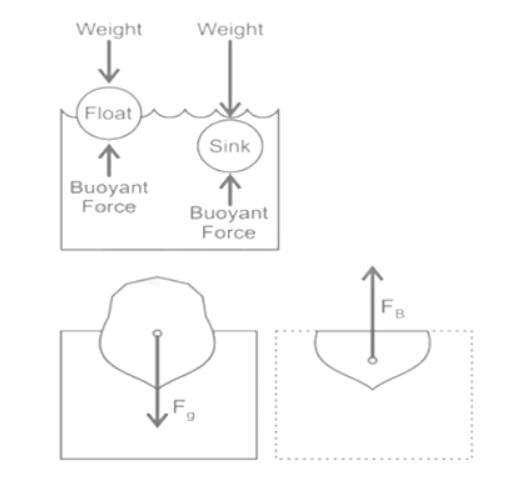EmSAT Achieve Exam > EmSAT Achieve Questions > When the weight of the fluid displaced is les...
Start Learning for Free
When the weight of the fluid displaced is less than the weight of the solid body then:
- a)Body floats
- b)The body will be half immersed in the fluid
- c)The body sinks in a fluid
- d)The body will be rotating
Correct answer is option 'C'. Can you explain this answer?
Verified Answer
When the weight of the fluid displaced is less than the weight of the ...
Archimedes principle:
- It is used to explain the law of flotation or upward thrust experienced when immersed in a fluid.
- The principle of Archimedes states “When a body is immersed in a liquid, an upward thrust, equal to the weight of the liquid displaced, acts on it.”
- The flotation and sinking of an object are dependent upon the relative density with each other.
- If the density of the object is more than the density of the liquid, the object will sink.
- On the other side, if the density of an object is less than the liquid, then it will float over it.
- If the density of the object and liquid is equal to each other, they are in equilibrium and float and sink both at the same time
- Therefore, the sinking or floating of an object depends on the difference in density of objects and liquid.
Weight = m × g = ρ × g × V
- If the upthrust force (equal to weight) exerted on the body by the fluid is greater than the weight of the body, then the body floats. While, if upthrust is lesser, then the body sinks.

Most Upvoted Answer
When the weight of the fluid displaced is less than the weight of the ...
Understanding Buoyancy and Sinking
When a solid body is placed in a fluid, it experiences buoyancy, which is the upward force exerted by the fluid. The behavior of the solid body depends on the relationship between the weight of the fluid displaced and the weight of the solid body.
Weight of Fluid Displaced vs. Weight of Solid Body
- If the weight of the fluid displaced is equal to the weight of the solid body, the body will float. This is known as neutral buoyancy.
- When the weight of the fluid displaced is greater than the weight of the solid, the solid will float and may be partially submerged.
- However, if the weight of the fluid displaced is less than the weight of the solid body, the following occurs:
The Body Sinks
- The solid body will not be able to displace enough fluid to equal its own weight.
- As a result, the upward buoyant force is insufficient to support the weight of the solid.
- Therefore, the body will sink to the bottom of the fluid.
Conclusion
In this scenario, the correct answer is option 'C': The body sinks in a fluid. This phenomenon illustrates the principles of density and buoyancy, which are crucial in understanding fluid mechanics. If the solid is denser than the fluid, it displaces less fluid than its own weight, leading to sinking.
When a solid body is placed in a fluid, it experiences buoyancy, which is the upward force exerted by the fluid. The behavior of the solid body depends on the relationship between the weight of the fluid displaced and the weight of the solid body.
Weight of Fluid Displaced vs. Weight of Solid Body
- If the weight of the fluid displaced is equal to the weight of the solid body, the body will float. This is known as neutral buoyancy.
- When the weight of the fluid displaced is greater than the weight of the solid, the solid will float and may be partially submerged.
- However, if the weight of the fluid displaced is less than the weight of the solid body, the following occurs:
The Body Sinks
- The solid body will not be able to displace enough fluid to equal its own weight.
- As a result, the upward buoyant force is insufficient to support the weight of the solid.
- Therefore, the body will sink to the bottom of the fluid.
Conclusion
In this scenario, the correct answer is option 'C': The body sinks in a fluid. This phenomenon illustrates the principles of density and buoyancy, which are crucial in understanding fluid mechanics. If the solid is denser than the fluid, it displaces less fluid than its own weight, leading to sinking.

|
Explore Courses for EmSAT Achieve exam
|

|
Question Description
When the weight of the fluid displaced is less than the weight of the solid body then:a)Body floatsb)The body will be half immersed in the fluidc)The body sinks in a fluidd)The body will be rotatingCorrect answer is option 'C'. Can you explain this answer? for EmSAT Achieve 2025 is part of EmSAT Achieve preparation. The Question and answers have been prepared according to the EmSAT Achieve exam syllabus. Information about When the weight of the fluid displaced is less than the weight of the solid body then:a)Body floatsb)The body will be half immersed in the fluidc)The body sinks in a fluidd)The body will be rotatingCorrect answer is option 'C'. Can you explain this answer? covers all topics & solutions for EmSAT Achieve 2025 Exam. Find important definitions, questions, meanings, examples, exercises and tests below for When the weight of the fluid displaced is less than the weight of the solid body then:a)Body floatsb)The body will be half immersed in the fluidc)The body sinks in a fluidd)The body will be rotatingCorrect answer is option 'C'. Can you explain this answer?.
When the weight of the fluid displaced is less than the weight of the solid body then:a)Body floatsb)The body will be half immersed in the fluidc)The body sinks in a fluidd)The body will be rotatingCorrect answer is option 'C'. Can you explain this answer? for EmSAT Achieve 2025 is part of EmSAT Achieve preparation. The Question and answers have been prepared according to the EmSAT Achieve exam syllabus. Information about When the weight of the fluid displaced is less than the weight of the solid body then:a)Body floatsb)The body will be half immersed in the fluidc)The body sinks in a fluidd)The body will be rotatingCorrect answer is option 'C'. Can you explain this answer? covers all topics & solutions for EmSAT Achieve 2025 Exam. Find important definitions, questions, meanings, examples, exercises and tests below for When the weight of the fluid displaced is less than the weight of the solid body then:a)Body floatsb)The body will be half immersed in the fluidc)The body sinks in a fluidd)The body will be rotatingCorrect answer is option 'C'. Can you explain this answer?.
Solutions for When the weight of the fluid displaced is less than the weight of the solid body then:a)Body floatsb)The body will be half immersed in the fluidc)The body sinks in a fluidd)The body will be rotatingCorrect answer is option 'C'. Can you explain this answer? in English & in Hindi are available as part of our courses for EmSAT Achieve.
Download more important topics, notes, lectures and mock test series for EmSAT Achieve Exam by signing up for free.
Here you can find the meaning of When the weight of the fluid displaced is less than the weight of the solid body then:a)Body floatsb)The body will be half immersed in the fluidc)The body sinks in a fluidd)The body will be rotatingCorrect answer is option 'C'. Can you explain this answer? defined & explained in the simplest way possible. Besides giving the explanation of
When the weight of the fluid displaced is less than the weight of the solid body then:a)Body floatsb)The body will be half immersed in the fluidc)The body sinks in a fluidd)The body will be rotatingCorrect answer is option 'C'. Can you explain this answer?, a detailed solution for When the weight of the fluid displaced is less than the weight of the solid body then:a)Body floatsb)The body will be half immersed in the fluidc)The body sinks in a fluidd)The body will be rotatingCorrect answer is option 'C'. Can you explain this answer? has been provided alongside types of When the weight of the fluid displaced is less than the weight of the solid body then:a)Body floatsb)The body will be half immersed in the fluidc)The body sinks in a fluidd)The body will be rotatingCorrect answer is option 'C'. Can you explain this answer? theory, EduRev gives you an
ample number of questions to practice When the weight of the fluid displaced is less than the weight of the solid body then:a)Body floatsb)The body will be half immersed in the fluidc)The body sinks in a fluidd)The body will be rotatingCorrect answer is option 'C'. Can you explain this answer? tests, examples and also practice EmSAT Achieve tests.

|
Explore Courses for EmSAT Achieve exam
|

|
Signup for Free!
Signup to see your scores go up within 7 days! Learn & Practice with 1000+ FREE Notes, Videos & Tests.


















